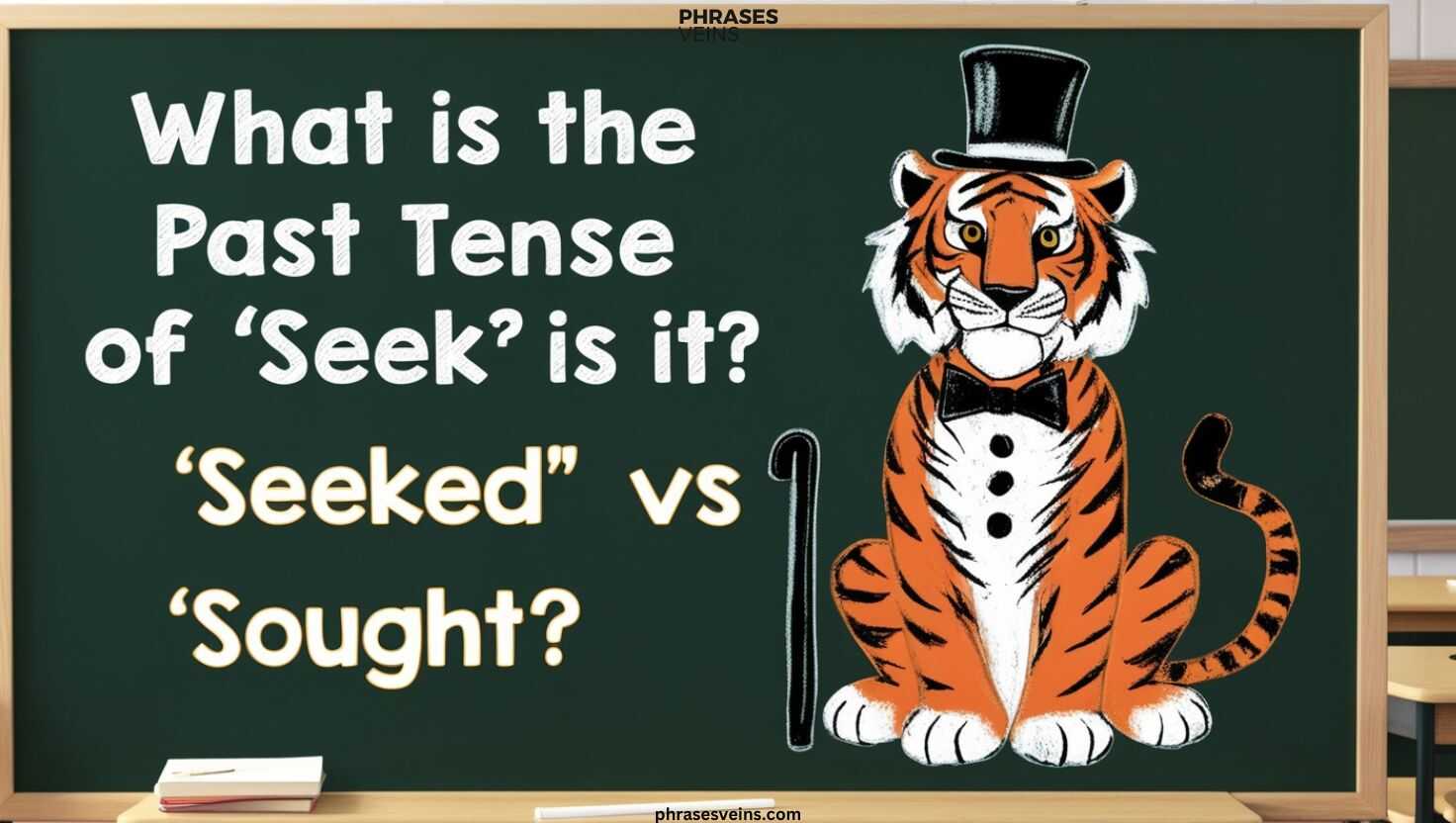When learning English, one common question is: What is the past tense of “seek”? Is it “seeked” vs “sought”? Understanding the correct form of irregular verbs like “seek” can be confusing for learners and even native speakers. This article will clear up this common misconception, provide examples for proper usage, and guide you through the nuances of English grammar.
Let’s See into the correct past forms, examples, and why “seeked” isn’t the right answer. By the end of this post, you’ll have a clear understanding of the usage of “sought” and its proper context in the English language.
What is the Past Tense of Seek?
The correct past tense of “seek” is “sought”. It’s one of those irregular verbs in English that doesn’t follow the standard “-ed” rule for creating the past tense. While many verbs in English have a predictable form, irregular verbs like “seek” require memorization because their past forms don’t follow regular patterns.
In short, you cannot use “seeked” as the past tense of “seek.” Instead, “sought” is the correct form. Let’s explore more about this distinction below.
Seeked vs Sought?
The confusion often arises because most verbs in English form their past tense by adding “-ed.” For example: “talk” becomes “talked,” and “walk” becomes “walked.” However, “seek” does not follow this rule. Its past tense is “sought”, not “seeked.”
To clarify, here’s a simple table showing the correct and incorrect forms:
| Present Tense | Past Tense (Correct) | Past Tense (Incorrect) |
|---|---|---|
| Seek | Sought | Seeked |
Understanding the Verb “To Seek”
The verb “to seek” is a fundamental term in the English language that signifies actively looking for, trying to obtain, or attempting to achieve something. It belongs to the category of irregular verbs, meaning its past forms don’t follow the typical “-ed” rule, which is why some might find its proper usage confusing. Let’s break down the meaning, usage of, and nuances of this verb to clarify its role in English grammar.
Meaning and Usage of “To Seek”
At its core, “to seek” means to search for or endeavor to obtain something. The verb is commonly used in both formal and informal contexts, making it versatile. You might seek approval, seek advice, or even seek help in various situations. It can also be used figuratively, as in seeking happiness or truth.
- Examples for “seek” in present tense:
- I seek help from my mentors when I face challenges.
- People often seek advice when making important life decisions.
The verb “seek” reflects action and determination. Its flexibility allows it to adapt to professional, casual, and philosophical discussions.
READ MORE >>> Top 101 Commonly Used Verbs That Start With R [2025]
The Correct Past of “Seek”
The correct form of the past tense of “seek” is “sought”, not “seeked.” This is where many individuals encounter a common misconception. The word “sought” represents a completed action, aligning with English grammar rules for irregular verbs.
- Examples for “sought” in past tense:
- Yesterday, I sought approval from my boss.
- She sought advice from her parents before making the decision.
The usage of “sought” adds clarity and demonstrates a strong grasp of proper usage in both written and spoken English.
Why “Seeked” Is Incorrect
One of the most frequent errors in using this verb is saying “seeked” as the past tense. Since “seek” is an irregular verb, it does not follow the standard “-ed” rule for forming its past forms. Therefore, using “seeked” is grammatically incorrect and can reflect a misunderstanding of English grammar.
To avoid this common misconception, it’s important to remember that “sought is” the correct past form of “seek.” This ensures clear communication and adherence to the nuances of the language.
Summary Table: “To Seek”
| Tense | Correct Form | Example Sentence |
|---|---|---|
| Present Tense | Seek | I seek help when I’m in trouble. |
| Past Tense | Sought | He sought advice from his best friend. |
| Present Participle | Seeking | She is seeking approval for her idea. |
| Past Participle | Sought | They have sought clarification already. |
Understanding and mastering the usage of “to seek” is essential for improving your English skills. Whether in formal writing or casual conversations, knowing when and how to use “sought” can enhance your language fluency and help you avoid the common misconceptions surrounding this important verb.
Seeked vs Sought: Understanding the Difference
Understanding the difference between “seeked” and “sought” comes down to knowing the rules of irregular verbs. While “seeked” might seem logical, it’s not grammatically correct. English learners often make this mistake because regular verbs use “-ed” for their past forms, but “sought” is an exception.
For example:
- Incorrect: I seeked help from a teacher.
- Correct: I sought help from a teacher.
Remember, using “sought” instead of “seeked” shows mastery of proper usage and the nuances of English grammar.
Examples of ‘Sought’ in Different Contexts
To truly grasp the usage of the word “sought”, let’s dive into detailed examples across various contexts. These scenarios will help you understand its proper usage, and how it differs from the common misconception of “seeked.”
Scenario 1: Writing an Email to a Colleague
“Yesterday, I sought approval from the team for the project timeline.”
In this example, the correct form “sought” is used to communicate a past action. It’s often seen in professional settings, where individuals need to seek approval or address formal matters. The usage of “sought” here adds a polished and professional tone, which is essential in workplace emails. Using “sought approval” instead of “asked for approval” demonstrates clarity and a command of English grammar.
Scenario 2: A Job Application Cover Letter
“I have always sought opportunities to enhance my skills in this field.”
This sentence highlights how “sought” can be used in a job application to reflect a proactive approach. Employers value individuals who actively seek opportunities to grow. The nuances of “sought” here imply determination and initiative, which are qualities often desired in a professional environment. Avoiding the common misconception of using “seeked” ensures your language reflects confidence and proper usage.
Scenario 3: Informal Conversation
“She sought advice from her best friend before making the decision.”
In everyday casual discussions, “sought” can still hold its ground as the correct past of “seek.” This example demonstrates how “sought” fits naturally into informal settings, such as asking for advice or guidance. The usage of “sought” conveys thoughtfulness and deliberation. On the other hand, “seeked advice” would sound incorrect and detract from the proper form.
Scenario 4: Business Letter to a Client
“We sought clarification regarding the terms of the agreement.”
In business correspondence, using “sought” adds a layer of professionalism and precision. It communicates that the company actively sought help or clarification to resolve an issue. The phrase “We sought clarification” shows intent and attention to detail, both crucial in maintaining a professional relationship. Such examples for “sought” highlight how it can be used to reflect the nuances of business etiquette while adhering to English grammar standards.
Why Not “Seeked”?
The reason “seeked” isn’t correct lies in the history and structure of English. Verbs like “seek” belong to a group of irregular verbs that change their forms in unique ways. Saying “seeked” might feel natural, but it’s grammatically incorrect.
Common irregular verbs like “find” (past tense: “found”) or “think” (past tense: “thought”) follow similar patterns. These verbs don’t take the regular “-ed” ending. Similarly, “seek” changes to “sought” in the past tense.
Other Common Irregular Verbs Like ‘Seek’
Here are some other irregular verbs you might find interesting:
| Base Form | Past Tense | Example Sentence |
|---|---|---|
| Find | Found | I found my keys on the table. |
| Think | Thought | She thought about the idea carefully. |
| Teach | Taught | He taught English for five years. |
| Catch | Caught | We caught the train just in time. |
Irregular verbs are tricky, but with practice, their usage becomes second nature.
Frequently Asked Questions
Is the word “seeked” correct?
No, the word “seeked” is not correct. The verb “seek” is an irregular verb, and its correct past tense is “sought”, not “seeked.” Saying “seeked” is a common misconception and considered grammatically incorrect in English grammar
Is it “sought” or “seeked advice”?
The correct phrase is “sought advice”. For example, “She sought advice from her mentor before making the decision.” Using “seeked advice” is incorrect because “seek” takes the irregular past form “sought.”
Is it “seek” or “sought”?
The choice between “seek” and “sought” depends on the tense of the sentence:
- Use “seek” in the present tense: “I seek help from my teacher.”
- Use “sought” in the past tense: “He sought approval from his colleagues.”
Understanding this difference ensures the proper usage of the verb in different contexts.
What is meant by “sought”?
The word “sought” is the past tense of “seek.” It means to have actively looked for, tried to obtain, or attempted to achieve something. For example:
- “She sought help from her family during a difficult time.”
- “They sought advice before investing in the stock market.”
It is commonly used in both formal and informal communication to convey deliberate action in the past.
Is “sought” a synonym?
Yes, “sought” can have synonyms depending on the context. Some synonyms for “sought” include:
- Looked for
- Searched for
- Pursued
- Requested
- Asked for
For example:
- “He sought approval from his manager” could also mean “He requested approval from his manager.”
What is “well sought”?
The phrase “well sought” refers to something that is highly desired, valued, or in demand. For example:
- “The new smartphone is a well-sought product in the market.”
- “Her advice is well sought by people looking for career guidance.”
This term is often used to highlight the significance or popularity of something that many individuals strive to obtain.
Conclusion
The next time you wonder whether to use “sought” or “seeked,” remember this: the correct past tense of “seek” is always “sought”. Avoiding “seeked” will make your English more polished and professional. Mastering the usage of irregular verbs like “sought” helps you sound confident and precise.
Whether you’re writing a formal email, preparing a speech, or simply chatting with friends, using the correct form will elevate your communication skills. English grammar might seem challenging, but understanding these nuances of language builds a strong foundation. So, the next time someone asks, “Is it ‘seek’ or ‘sought’?” you’ll know the correct answer is clear: it’s sought!

Welcome to PhrasesVeins, where Arabella Reed brings language to life. With a passion for grammar and phrases, Arabella offers unique insights to help you master language and enhance your expression. Whether you’re a language enthusiast or looking to improve your skills, Arabella’s work guides you through the beauty of words.

